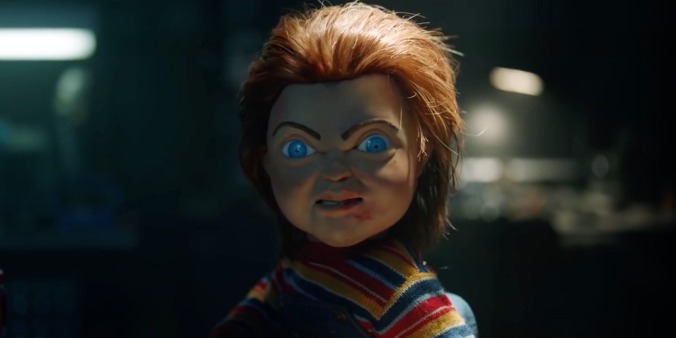Photo: United Artists Releasing
Kids these days, with their newfangled wi-fi enabled homicidal dolls. Back when we were whippersnappers attending the 1988 stab-a-thon Child’s Play, we got a low-tech Chucky and we liked it! It didn’t matter if we had to walk two miles uphill both ways to the cineplex, it was worth it just to see a serial murderer using voodoo magic to implant his vengeful consciousness into the vessel of a child’s plaything. It was an honest, simpler time, when a crazed two-foot-tall killing machine had to rely on his cunning and his trusty butcher knife to get the job done. None of this hoity-toity pairing with compatible devices in the home and workplace! When purists talk about digital cinema lacking the soul of its analog predecessors, it’s usually not this literal.
Abe Simpson voice aside, Lars Klevberg’s new Child’s Play remake does lose something by choosing to attribute Chucky’s demon seed to a disgruntled Vietnamese sweatshop worker disabling a microchip’s protocols. Screenwriter Tyler Burton Smith likely used the word “update” in his pitch meeting, the general idea being that a new era requires a souped-up villain with the voice of Mark Hamill, his nasal cackle still echoing in millennial brains reared on Batman: The Animated Series. But in imbuing the character with vaguely defined, near-limitless superpowers —the X-Men would label him a “technopath,” though he often acts like an ill-tempered Furby—the film turns its poster boy into a more imprecise threat. The original Child’s Play married violence with impish mischief and elaborate Rube Goldberg machines of gore, each kill up close and personal. The remake’s effort to replicate such a scene makes nouveau-Chucky’s killing blow the raising of a central AC unit’s thermostat, a move as inert and un-cinematic as his ability to make TVs obey his commands.
Whatever power to frighten the character has retained feels only semi-deliberate; the skin-distending animatronics moving Chucky’s face are creepy, but in an uncanny valley sort of way. Beleaguered single mom Karen (Aubrey Plaza) brings the toy home from the reject bin at the big-box store where she works, in the hopes that her lonely son Andy (Gabriel Bateman) might appreciate a new friend during a difficult adjustment period. They’ve just moved to town, and Mom’s got a jerk boyfriend gradually working his way from verbal to physical abuse. So Andy does find some comfort in having someone who exists solely to be best pals forever.
The most disturbing passages of the film show how affection can be used as a cudgel, and how love can curdle first into possession and then into an intimate form of bullying. Chucky wants more attention and devotion from Andy than any one person could possibly give another, and when those demands aren’t met, anyone perceived as a challenge to their BFF status has to die. Chucky’s jealousy and coercive sweetness mirrors the behavior profile of a toxic boyfriend, and it’s all the more chilling that this relationship dynamic has been projected with a slight psychosexual tinge onto a boy and his plastic li’l buddy.
That alone would be a sound basis for a horror movie, but Smith’s script serves an evident need to do or be more in order to fill out the film’s 90 already-inflated minutes. (In one sequence, Andy makes a couple of thinly sketched pals, and the three of them get distracted with an extended detour to retrieve a gift-wrapped severed head from a neighbor’s apartment down the hall.) Playing a cop clumsily grafted onto a story that doesn’t quite need him, Brian Tyree Henry makes the second-rate writing sound like great theatre, yet he’s still an awkward presence in the film. There’s a hum in the background about the impending rollout of new models in the “Buddi” line that produced Andy’s evil playmate, cuing up a chaotic finale involving demonically corrupted teddy bears. But what self-respecting Chucky movie shies away from its integral Chucky-ness? At least the original franchise waited a few installments before bringing in Jennifer Tilly to spice things up.
It all speaks to a lack of faith in the character as Brad Dourif first established him thirty-plus years ago. Dourif’s Chucky had attitude, a personality, and hot pumping blood, all of which have made him an enduring (and ongoing) presence at multiplexes for the better part of three decades. Klevberg and Smith reduce Chucky to a malevolent automaton, his dialogue limited to parroting back someone else’s catchphrases. There’s a metaphor in there somewhere, about a film rewording a past success and outputting only a garbled repetition. As an enchanted talisman housing a depraved mind, Chucky was born one-of-a-kind. As nothing more than a glitching machine, he lacks the sniggling spirit that made him special. He’s been mass-produced.


 Keep scrolling for more great stories from A.V. Club.
Keep scrolling for more great stories from A.V. Club.